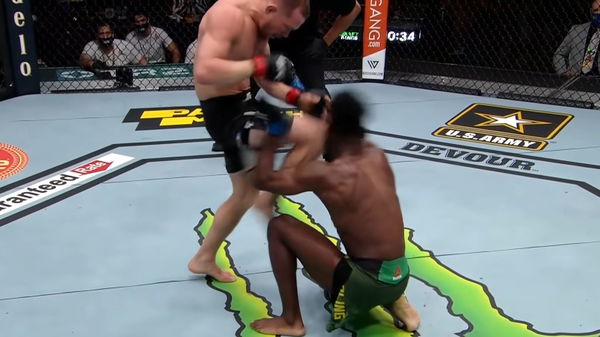

California State Athletic Commission executive director, Andy Foster, aims to address the persistent issue of knees to the head of a grounded fighter in MMA. The rule’s ambiguity and inconsistent application have led to confusion and safety concerns, most recently evident in the UFC 297 bout between Arnold Allen and Movsar Evloev.
Therefore, Foster has come out with a proposal that seeks to change the ambiguity surrounding the rules and provide a better experience for fans and fighters alike. As such, let’s explore what he had to say and take a look at 3 examples of fights where the rules surrounding grounded opponents have led to confusion, chaos, and even the crowning of a new UFC champion!
Andy Foster wants to get rid of the “hand” in MMA rules for grounded opponents
ADVERTISEMENT
Article continues below this ad
Andy Foster plans to propose a significant change at the upcoming Association of Boxing Commissions (ABC) rules committee meeting, advocating for the removal of the ‘hand’ as a defining factor for a grounded fighter.
During a conversation with Ariel Helwani on ‘The MMA Hour,’ he stated, “We’re going to get rid of the hand. That’s my proposal. We’re going to get rid of it. If you want to be down, you need to put something else down. Knee, back, anything. Anything other than — you can’t be standing up, putting your hand on the ground. It’s caused too much confusion.”
He further went on to explain that this departure from the current rule aims to provide clarity and uniformity across jurisdictions. Foster also asserted that this change will not only enhance safety and regulatory efficiency but may also lead to more action in the cage.
He stated, “It’s just a bizarre game we’ve created. Stand up and box or kickbox, set up your shot, do something, or get on the ground and grapple. One of the two.”
The envisioned modification reflects Foster’s commitment to improving the sport’s rules, promoting a cleaner and more straightforward experience for fighters, officials, and fans alike! Therefore, in light of his statements, let’s take a look at fights that were impacted by the uncertainty surrounding the grounded opponent rule!
3 fights that were impacted by the ‘grounded opponent’ rule
Arnold Allen vs. Movsar Evloev
The recent UFC 297 event in Toronto was marked by a controversial moment involving ‘illegal’ knees in the clash between Arnold Allen and Movsar Evloev. In the third round, controversy arose as Allen delivered a series of knees to Evloev while he was in a front headlock. Although no point was deducted, referee Marc Goddard called a timeout and paused the fight as he believed the strikes were illegal.
In a post-fight statement, Allen revealed that, “His hand was off even with the rule. Every knee that landed his hand was in the air. I lifted him up, knee, I lifted him up, knee, I lifted him up, knee. Even with that hand down, hand up rule, they were all legal.”
His comments highlighted Foster’s claims that the rules are subject to interpretation by the referee and do not provide clear guidelines for all parties inside the Octagon. Allen lost the fight via a unanimous and the incident involving the knees showcases the need for clearer rules defining a grounded opponent.
Petr Yan vs. Aljamain Sterling 1
Aljamain Sterling claimed the UFC bantamweight championship under unprecedented circumstances at UFC 259 in 2021. The fight, initially an offensive showcase, saw Sterling take the lead, with Petr Yan largely responding to his opponent’s attacks. As the contest progressed, Sterling’s stamina became a concern, but before answers could emerge, an illegal knee halted the action.
In the final sequence of Round 4, with Sterling in a compromised position after a failed takedown, Yan ignored the referee’s warning about his downed opponent and delivered a knee to Sterling’s head. The impact visibly injured Sterling, prompting the referee to call for the cage-side doctor.
Despite Sterling’s disappointment and tears, the fight was stopped, and UFC CEO Dana White awarded him the championship belt, making him the first-ever champion to win the title via disqualification! And yet again, highlighting the problems with the current rules regarding a grounded opponent in MMA.
Chris Weidman vs. Gegard Mousasi
In the co-main event of UFC 210 in 2017, Gegard Mousasi secured a controversial second-round TKO victory over Chris Weidman, adding to the discourse surrounding the rules regarding knee strikes to grounded opponents.
The fight’s pivotal moment occurred when Mousasi landed two knees on Weidman, with the legality of the second knee questioned due to Weidman lifting his hand off the mat. Referee Dan Miragliotta halted the fight, believing the knee was illegal, initiating a chaotic sequence.
ADVERTISEMENT
Article continues below this ad
Despite New York rules against instant replay use, Miragliotta sought input from official “Big” John McCarthy. Conflicting interpretations of the rules led to a prolonged delay, with UFC officials and commentators providing varied opinions. Miragliotta eventually waved off the fight, awarding Mousasi the win, once again, highlighting the chaos caused by the “grounded opponent” rule in the fight.
Watch This Story: Nina-Marie Daniele Makes Emotional Plea To Jon Anik
These incidents collectively underscore the importance of establishing consistent and transparent guidelines for referees and fighters alike. As the MMA community reflects on these controversies, Andy Foster’s proposal brings a much-needed change for regulatory bodies to address and rectify the existing ambiguities, ensuring the safety and fair competition of fighters inside the Octagon!
ADVERTISEMENT
Article continues below this ad
What do you think about the proposed changes to MMA rules by CSAC executive director Andy Foster? Share your thoughts in the comments below!

